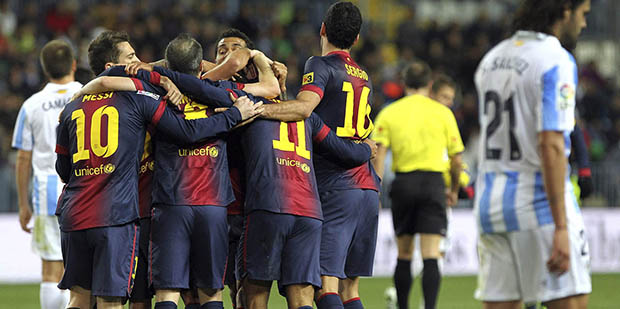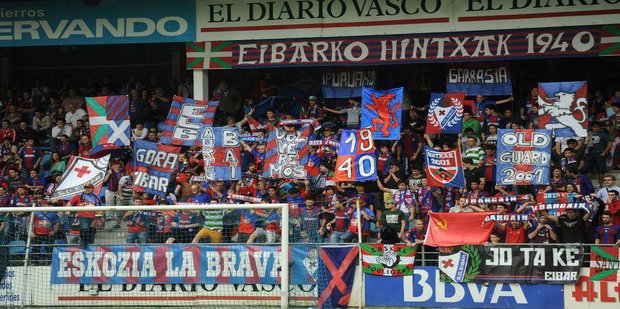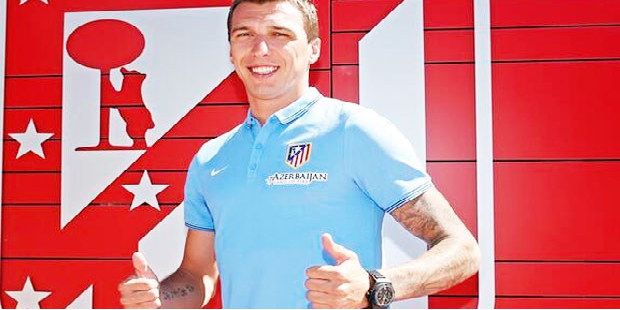- S.D. Eibar ready for maiden La Liga outing
- SD Eibar stengthen ahead of debut La Liga season
- Can ‘Super Mario’ live up to expectations in Madrid?
- MAN IN THE GROUND – Brentford 0 – 4 Osasuna
- Historic Basque derby welcomes S.D. Eibar to La Liga
- Munich to Madrid, via Brazil – Tony Kroos
- Rakitic in Spanish Switch
- Can Spain find redemption in Rio?
- Viva Espana! A season of redemption for Spanish football
- From the old to the new: who can fill the void in years to come for La Roja?
Style over substance?
- Updated: 6 April, 2013

Does the end justify the means?
If you achieve your goals and objectives, does it matter how you went about it?
If one side dominates their opponent, creating but not taking their chances whilst playing a stylish brand of attacking football yet losing to a stubborn, resolute defensive display, which team should we celebrate?
The pragmatic winners or the idealistic losers?
Is the team that adapts to the situation, deploying itself in the manner most likely to deliver victory, even if that requires a highly defensive approach, entirely correct? Or should the team that seeks to impose itself and its vision of football upon its opponent, remaining true to their overarching principles be praised irrespective of the outcome? In football, what do we prize above all else?
It must surely be the result. For the result is the only thing that matters.
Will Real Madrid fans really care about the football they produced under Mourinho if he delivers la decima? Mourinho is a winner. He wins, that what he does. How Madrid get to that result will be irrelevant.
Or, is there something greater than the result. Something that lasts longer. A legacy as Xavi Hernandez, lynchpin of the Barcelona side and ultimately the ideologue of tiki taka, states so eloquently. Xavi echoes the musings of a decent footballer who once said “there is no greater prize than being acclaimed for you style”.
Of course. Style.
The prize which the gallant loser must fervently cling to. It’s the fallback position. The defence mechanism. We lost but we still have style of play to grasp. The dream of a football idealist. An elitist caught in a time warp believing things were always so much better in previous years. Players were so much more innocent and stuck to their beliefs, attempting to play the beautiful game with no thoughts for the repercussions. The oft quoted cliché of players playing for the sheer love of the game, which was true, to an extent. Their innocence lost and tarnished by the continued rise of a cynicism and the win at all costs mentality of the professional game as the modern era developed.
We can all remember the great winners. The Brazil team in 1970, the Ajax team under Rinus Michels, Liverpool in the early 1980′s, Saachi’s Milan who were the last team to successfully defend the European Cup. More recently, Barcelona under Guardiola during the past four seasons. Spain under Aragones and now del Bosque winning three successive international tournaments, creating history in the process. The creation of the legacy that Xavi speaks of. Teams that dominated their era and became the benchmark. And teams that all had a finite lifespan.
But what about the other great teams? Those teams who came so close to the prize yet fell just short. Are they worthy of our praise too?
The Holland team of 1974 and 1978 who failed in two successive World Cup finals. And of course, the greatest team never to win a World Cup. The Brazil team of 1982. The team of Falcao, Junior and the truly great Socrates. The grainy images flickering across our TV screens of exotic footballers playing with a swagger and style seldom seen. And losing.
Were these really great teams? If so, why did they not win? Why are we cherishing losers?
They must have delivered something though, otherwise why would they still be recalled so fondly after all of these years. Are the teams mentioned above more worthy than winners such as Steau Bucharest in the 1986 European Cup Final, Greece in the 2004 European Championships or even Chelsea in the 2012 Champions League Final?
What did the above teams do so badly that means we chose to denigrate certain winners? Why do we attack certain teams approach to games? Why was the achievement of Milan in defeating Barcelona 2-0 rounded upon in some quarters? This was not an exercise in parking the bus; this was a Rolls Royce performance. A performance perfectly executed individually, collectively and above all, tactically. Yet, in years to come that performance will be reduced to a footnote partly owing to Barcelona’s comeback in the second leg and partly by the slavish devotion to aesthetics.
Is a defensive approach really less worthy than an attacking approach? What qualities do we find most attractive in football? Defensive structure and organisation or attacking creativity and guile? Is a quick one two which beats two of three static defenders a greater piece of skill than a perfectly timed sliding tackle? How about a defensive block executed by superb positioning? Or a pair of central midfielders naturally, attack minded and yet sacrificing themselves for the team and performing considerable defensive duties.
Do we accept such qualities were they are displayed by our own team but question their legitimacy when implemented by opponents to the detriment of our footballing heroes? In 10 years or 20 years time, who will we remember from this time period? The Inter team of 2010, who adopted a counter attacking philosophy against Barcelona in the Champions League semi final and then again against Bayern Munich in the final yet were successful, or the Chelsea team of 2012 who seemingly defied the odds to overcome a first leg deficit at the hands of Napoli in the quarter finals, were outplayed yet held on for victory against Barcelona in the semi final before triumphing on penalties against Bayern Munich in the final?
Or will we remember the Barcelona team under first Rijkaard and then Guardiola who delivered trophies with a panache and style seldom seen and yet, who twice succumbed to arguably weaker teams in Champions League semi finals? Or the Bayern team under Jupp Heynckes who were committed to attacking football yet saw the great prize of European club football elude them? So far.
Both Inter and Chelsea demonstrated tremendous workrate and concentration in the face of seemingly superior opponents. They defended resiliently throughout, working diligently to limit their opponents attacking potential. Were the performances really that similar though? Do we not fail to see the elements which differentiate them? It’s convenient to label them both as defensive teams that parked the bus but that’s lazy and incorrect. The difference between just parking the bus and hoping and defending well is control of space. Inter controlled space and were remarkably comfortable despite extremely limited possession. Chelsea clung on through poor finishing, last gasp defending and an element of luck. Both approaches gathered victories but only the former could be seen as a coherent plan which could be implemented again. Both won. Both became European Champions. Is that not enough to celebrate?
Or were they simply two expensively assembled teams who were afraid to face up to quality opponents. Surely we always want to win and in doing so, exhibit qualities which the opposition lack and which they can only aspire to? Or is 1-0 carved out by luck, skill and sheer workrate sufficient for us?
Perhaps it will be determined by our outlook.
It’s the nostalgic look back in time, the ability to only recall those teams and games which fit neatly into our own paradigm. A reflection that conveniently overlooks episodes which we find distasteful as determined by our own views. We watch football yet we chose what we want to see.
When our team wins 1-0 through a dogged defensive display, we applaud their determination, their commitment, and their endeavour. When our team is foiled by a defensive display, we attack the negative approach of the opponent for killing the game using spoiling tactics. We only seeing footballing history through a revisionist perspective tainted by our own footballing ideology. We celebrate those who fit into our accepted views, offering at best grudging praise when a team wins but does not conform to our values. We recall the great moments, those that define a particular episode or era and conveniently forget those moments which tarnish or belittle our memories.
Yet we should not see the game in such reductionist terms. Somewhere along this journey we have lost sight of the variations within the game in an effort to celebrate only one type of football. In doing so, do we not realise the inherent pragmatism within tiki taka itself? It’s firstly a defensive strategy. If we have the ball, you cannot score. It brings about moments of creativity interspersed by periods of sterile domination. It’s become the ubiquitous stick with which to beat Spain by those who want to see more transitional based football with less control. Rather than seeing football in a simplistic dichotomy of attacking football versus defensive football, we should instead consider the vast range of subtle tactical and non-tactical nuances which occur during a game.
The small details.
The movement of a defensive midfielder closer to the centre backs to eliminate a pocket of space. The central midfielder pushing further to the right to link with his right winger and overload the opposing full back. We should embrace the volume of possibilities which football presents us with.
Football was, is and will always be a series of proactive and reactive battles.
The great tactical innovators like Saachi and Guardiola created new methods of playing the game which spawn imitators and eventually, the new brand of football is overcome. We move on. Football will always exist in cycles, formations which were once seen as unbeatable, are discarded for years only to later re-emerge, reinvigorated by new ideals and playing methods. Within all football formations there is an element of pragmatism. Teams play a brand of football that they believe will provide them with the best opportunity to achieve their objectives, adapting and deploying their resources accordingly.
In football, the winner does not automatically take it all. For sometimes, a game of football is not played to determine who wins a trophy, sometimes it represents something more. Sometimes, it dictates what direction football will take in the coming years. We are witnessing the present battle of possession based football against a reactive, transition based game. The path we will tread for the next few years has not yet been decided. The outcome of the Champions League may help decide which route we take.
Follow @icentrocampista






You must be logged in to post a comment Login